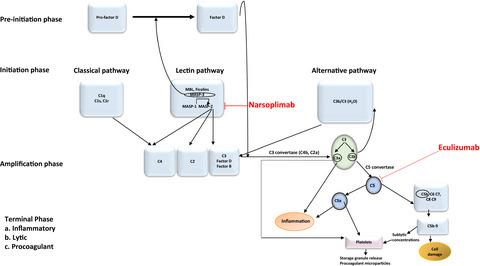当前位置:
X-MOL 学术
›
Clin. Exp. Immunol.
›
论文详情
Our official English website, www.x-mol.net, welcomes your
feedback! (Note: you will need to create a separate account there.)
MASP2 levels are elevated in thrombotic microangiopathies: association with microvascular endothelial cell injury and suppression by anti-MASP2 antibody narsoplimab.
Clinical & Experimental Immunology ( IF 3.4 ) Pub Date : 2020-07-18 , DOI: 10.1111/cei.13497 S Elhadad 1 , J Chapin 1 , D Copertino 1 , K Van Besien 1 , J Ahamed 2 , J Laurence 1
Clinical & Experimental Immunology ( IF 3.4 ) Pub Date : 2020-07-18 , DOI: 10.1111/cei.13497 S Elhadad 1 , J Chapin 1 , D Copertino 1 , K Van Besien 1 , J Ahamed 2 , J Laurence 1
Affiliation

|
Involvement of the alternative complement pathway (AP) in microvascular endothelial cell (MVEC) injury characteristic of a thrombotic microangiopathy (TMA) is well documented. However, the role of the lectin pathway (LP) of complement has not been explored. We examined mannose‐binding lectin associated serine protease (MASP2), the effector enzyme of the LP, in thrombotic thrombocytopenic purpura, atypical hemolytic uremic syndrome and post‐allogeneic hematopoietic stem cell transplantation (alloHSCT) TMAs. Plasma MASP2 and terminal complement component sC5b‐9 levels were assessed by enzyme‐linked immunosorbent assay (ELISA). Human MVEC were exposed to patient plasmas, and the effect of the anti‐MASP2 human monoclonal antibody narsoplimab on plasma‐induced MVEC activation was assessed by caspase 8 activity. MASP2 levels were highly elevated in all TMA patients versus controls. The relatively lower MASP2 levels in alloHSCT patients with TMAs compared to levels in alloHSCT patients who did not develop a TMA, and a significant decrease in variance of MASP2 levels in the former, may reflect MASP2 consumption at sites of disease activity. Plasmas from 14 of the 22 TMA patients tested (64%) induced significant MVEC caspase 8 activation. This was suppressed by clinically relevant levels of narsoplimab (1·2 μg/ml) for all 14 patients, with a mean 65·7% inhibition (36.8–99.4%; P < 0·0001). In conclusion, the LP of complement is activated in TMAs of diverse etiology. Inhibition of MASP2 reduces TMA plasma‐mediated MVEC injury in vitro. LP inhibition therefore may be of therapeutic benefit in these disorders.
中文翻译:

MASP2 水平在血栓性微血管病中升高:与微血管内皮细胞损伤和抗 MASP2 抗体 narsoplimab 的抑制相关。
补体旁路途径 (AP) 参与血栓性微血管病 (TMA) 的微血管内皮细胞 (MVEC) 损伤特征已有充分记录。然而,补体凝集素途径(LP)的作用尚未被探索。我们检查了甘露糖结合凝集素相关丝氨酸蛋白酶 (MASP2)(LP 的效应酶)在血栓性血小板减少性紫癜、非典型溶血性尿毒症综合征和异基因造血干细胞移植后 (alloHSCT) TMA 中的作用。通过酶联免疫吸附测定 (ELISA) 评估血浆 MASP2 和末端补体成分 sC5b-9 水平。将人 MVEC 暴露于患者血浆,并通过 caspase 8 活性评估抗 MASP2 人单克隆抗体 narsoplimab 对血浆诱导的 MVEC 激活的影响。与对照组相比,所有 TMA 患者的 MASP2 水平均显着升高。与未发生 TMA 的 alloHSCT 患者相比,患有 TMA 的 alloHSCT 患者的 MASP2 水平相对较低,并且前者的 MASP2 水平方差显着降低,可能反映了疾病活动部位的 MASP2 消耗。所测试的 22 名 TMA 患者中有 14 名 (64%) 的血浆诱导了显着的 MVEC caspase 8 激活。所有 14 名患者的临床相关水平的 narsoplimab (1·2 μg/ml) 均抑制了这一现象,平均抑制率为 65·7% (36.8–99.4%; P < 0·0001)。总之,补体 LP 在不同病因的 TMA 中被激活。体外抑制 MASP2 可减少 TMA 血浆介导的 MVEC 损伤。因此,LP 抑制可能对这些疾病有治疗作用。
更新日期:2020-07-18
中文翻译:

MASP2 水平在血栓性微血管病中升高:与微血管内皮细胞损伤和抗 MASP2 抗体 narsoplimab 的抑制相关。
补体旁路途径 (AP) 参与血栓性微血管病 (TMA) 的微血管内皮细胞 (MVEC) 损伤特征已有充分记录。然而,补体凝集素途径(LP)的作用尚未被探索。我们检查了甘露糖结合凝集素相关丝氨酸蛋白酶 (MASP2)(LP 的效应酶)在血栓性血小板减少性紫癜、非典型溶血性尿毒症综合征和异基因造血干细胞移植后 (alloHSCT) TMA 中的作用。通过酶联免疫吸附测定 (ELISA) 评估血浆 MASP2 和末端补体成分 sC5b-9 水平。将人 MVEC 暴露于患者血浆,并通过 caspase 8 活性评估抗 MASP2 人单克隆抗体 narsoplimab 对血浆诱导的 MVEC 激活的影响。与对照组相比,所有 TMA 患者的 MASP2 水平均显着升高。与未发生 TMA 的 alloHSCT 患者相比,患有 TMA 的 alloHSCT 患者的 MASP2 水平相对较低,并且前者的 MASP2 水平方差显着降低,可能反映了疾病活动部位的 MASP2 消耗。所测试的 22 名 TMA 患者中有 14 名 (64%) 的血浆诱导了显着的 MVEC caspase 8 激活。所有 14 名患者的临床相关水平的 narsoplimab (1·2 μg/ml) 均抑制了这一现象,平均抑制率为 65·7% (36.8–99.4%; P < 0·0001)。总之,补体 LP 在不同病因的 TMA 中被激活。体外抑制 MASP2 可减少 TMA 血浆介导的 MVEC 损伤。因此,LP 抑制可能对这些疾病有治疗作用。











































 京公网安备 11010802027423号
京公网安备 11010802027423号